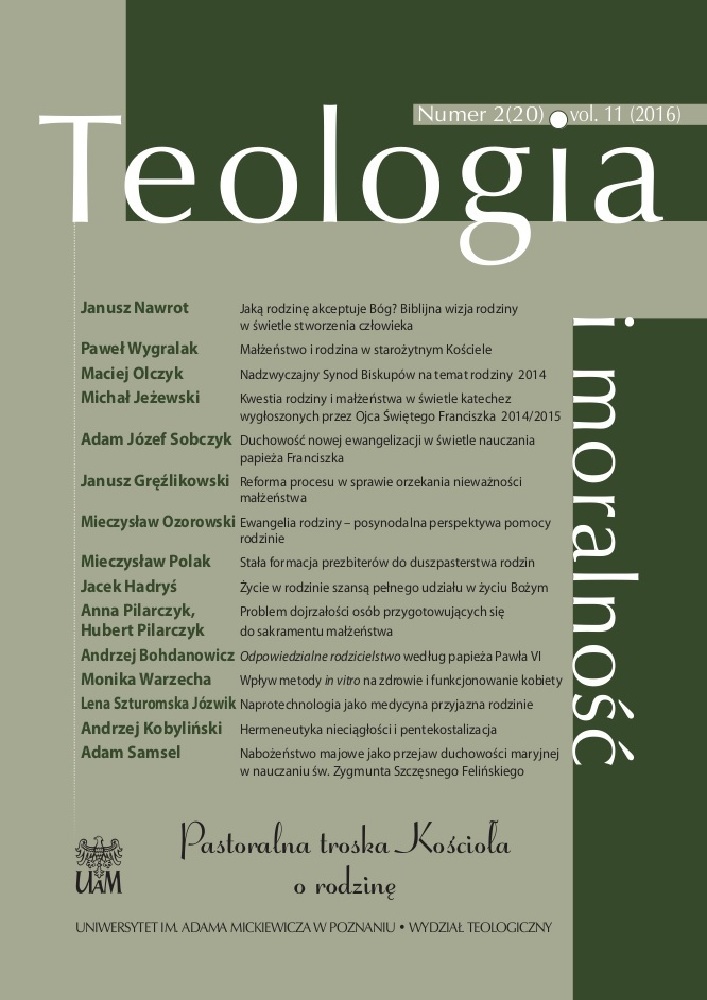Abstract
NaProTechnology is an integrated and systematic system about treatment of marital infertility. It is based on an analysis of the transformations occurring in women’s bodies, where patients receive knowledge about fertility and analyze specific biomarkers. As a result, patients become equal partners in the process of assessment and treatment of their own cycles.NaProTechnology is also precise and consistent knowledge about family and marriage, of which indissolubility is an essential aspect, despite the difficulties of treatment, or its possible negative effect. SPICE index is an important part of NaProTechnology. The acronym comes from the English words: spiritual, physical, intellectual, creative and emotional. Work on each of these aspects is undertaken in cooperation with the instructor The starting point in discussiom about marital relationship is a definition of sexual contact, which is very wide. It consists of physical and mental structure of people involved in building the community. At the same time sexual contact can put the fertility of a man in the right place, improving essentially the quality of life. Sexual contact is made at all levels listed in the SPICE index, because all of these areas are united.
References
Balthasar H.U. von, Teodramatyka, tłum. W. Szymona, t. 2/1, Kraków 2006.
Bączkowski T., Kurzawa R., Diagnostyka i leczenie niepłodności w warunkach ambulatoryjnych, „Przewodnik Lekarski” 1 (2012), s. 154-158.
Benedict XVI, Encyklika Deus Caritas es.
Bogusz R., Gałęziowska E., Bioetyczne oraz społeczne uwarunkowania zapłodnienia in vitro w opinii położnych, „Medycyna Ogólna i Nauki o Zdrowiu” t. 17 (2011), nr 2, s. 75-79.
Boyle P., SPICE Index for infertile coupe, www.slideserve.com/irisa/spice-index [dostęp: 26.05.2016].
Chapman G., Pięć języków miłości, Kraków 2014, w: www.5lovelanguages.com [dostęp: 29.05.2016].
Głaz S., Sens życia, Kraków 1998.
Główny Urząd Statystyczny, Rocznik demograficzny 2013, Warszawa 2013.
Gokim Tagle L.A., Ludzie Wielkiej Nocy, tłum. M. Chojnacki, Kraków 2014
Grześkowiak J., „Tajemnica to jest wielka”. Sakramentalne przymierze małżeńskie, Opole 2010.
Haberko J., Prawo do leczenia niepłodności a finansowanie świadczeń zdrowotnych ze źródeł publicznych, „Ginekologia Praktyczna” 2(15) 2007, s. 23-29;
Hilgers T., Reproductive Anathomy and Physiology. A primer for FertilityCare Professionals, Omaha 2002.
Hilgers T., Creighton Model FertilityCare System. An authentic language of a woman’s health and fertility. An Introductowy Booklet for New Users, Omaha 2011.
Hilgers T., The Creighton Model FertilityCare System. A standardized Case Management Approach to Teaching, Book I: Basic Teaching Skills, Omaha 2002.
Höffner J., Chrześcijańska nauka społeczna, tłum. I. Bokwa, Warszawa 1999.
International Association of Catholic Bioethicists, Statement on Regenerative Medicine and Stem Cell Research, “National Catholic Bioethics Quarterly” 8.2 (2008), nr 3, s. 40.
Stanford J.B, Parnell T.A., Boyle P.C., Outcomes From Treatment of Infrtility With Natural Procreative Technology in an Irish General Practice, “The Journal of the American Board of Family Medicine” 21 (2008) nr 5.
Jan Paweł II, adhortacja apostolska Familiaris consortio, nr 11.
Jan Paweł II (przemówienie do lekarzy włoskich 27.10.1980), w: T. Pasierski, Humanizacja nauczania medycyny w Polsce w XXI wieku, www:docplayer.pl/14657216-Humanizacja-nauczania-medycyny-w-polsce-w-xxi-wieku.html [dostęp: 19.05.2016].
Jan Paweł II, Celebracja życia. Homilia podczas Mszy Świętej na Capitoll Mall, Waszyngton 7.09.1979, w: Jan Paweł II, O małżeństwie i rodzinie (1978-1982), red. A. Wieczorek, T. Żeleźnik i J. Sobiepan, Warszawa 1983, s. 121-124.
Jan Paweł II, encyklika Evangelium vitae, nr 53.
Jędrzejczak P., Sokalska A., Niepłodność żeńska; w: Niepłodność, red. Z. Słomko, wyd. Lekarskie PZWL, Warszawa 2008, s. 476-484.
Lebech M., Statement on Caring and giving hope to persons living with progressive cognitive impairments and those who care for them, “The National Catholic Bioethics Quarterly” 10 (2010), nr 3.
Katolo A.J., ABC bioetyki, www.mateusz.pl/ksiazki/ajk-abcb/ajk-abcb-03.htm [dostęp: 01.06.2016].
Kongregacji Nauki Wiary, Instrukcja Dignitas personae, nr 12.
Kuczyński W., Kurzawa R., Oszukowski P., Pawelczyk L., Poręba R., Radowicki S., Szamatowicz M., Wołczyński S., Rekomendacje dotyczące diagnostyki i leczenia niepłodności, „Ginekologia Polska” 83 (2012), nr 2, s. 151.
Lubowicki K., Duchowość małżeństwa w nauczaniu Jana Pawła II, Kraków 2005.
Macek W.W., Teologia nauki według księdza Michała Hellera, wyd. UKSW, Warszawa 2010.
Mirkes R., Women’s Health Care and the New Humanism, “The Catholic Response” 1(1) 2004.
Olearczyk T., Oddziaływanie wychowawcze rodziny a pola wpływów „pedagogiki pozarodzinnej” w warunkach demokracji, w: Edukacja prorodzinna, red. M. Chymuk, D. Topa, Kraków 2000.
Olejnik S., Zarys teologii moralnej. W odpowiedzi na dar i powołanie Boże, Warszawa 1979.
Pacholczyk T., NFP and the Telos of sex, Making Sense of Bioethics, 05.2011, s. 2, www.ncbcenter.org/document.doc?id=735, [dostęp: 29.05.2016].
Pacholczyk T., NFP and the telos of sex, 11.05.2011, www.catholic-sf.org/news_select.php?newsid=6&id=58535, [dostęp: 29.05.2016].
Pasierski T., Humanizacja nauczania medycyny w Polsce w XXI wieku, w: www.docplayer.pl/14657216-Humanizacja-nauczania-medycyny-w-polsce-w-xxi-wieku.html [dostęp: 29.05.2016].
Rutstein S.O., Iqbal H.S., Infecundity, Infertility and Childlessness in Developing Countries, DHS Comparative Reports nr 9, Calverton, Maryland, USA: ORC Macro and the World Health Organization, 2004.
Spaczyński R.Z., Pawelczyk L., Profilaktyka i epidemiologia niepłodności w: Profilaktyka w położnictwie, ginekologii i neonatologii, red. Z. Słomko, K. Drews, T. Niemiec, Poznań 2005, s. 29-41.
Szymczyk L., Relacje w rodzinie a rozwój tożsamości i identyfikacji płciowej dziecka w wieku przedszkolnym, „Fides et Ratio” 3 (2013).
Ślipko T., Zarys etyki szczegółowej, Kraków 1982, t. 2.
Troska J., Moralność życia płciowego, małżeńskiego i rodzinnego, Poznań 1998.
Williams J.R., Podręcznik etyki lekarskiej, tłum. M. Szewczyński, 2005.
Wojtyła K., Miłość i odpowiedzialność, Lublin 1982.
World Health Organization, International Statistical Classification of Diseases and Related Health Problems, nr 2, Geneva 2011.
World Health Organization, Reproductive health indicators for global monitoring: Report of the second interagency meeting, Geneva, 2001, WHO/RHR/01.19, s. 23, [dostęp: 19.05.2016].
Wróbel J., Człowiek i medycyna. Teologicznomoralne podstawy ingerencji medycznych, Kraków 1999.
License

This work is licensed under a Creative Commons Attribution-NoDerivatives 4.0 International License.
